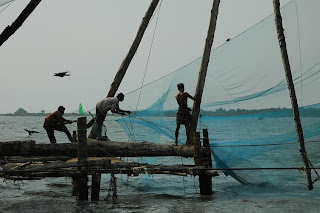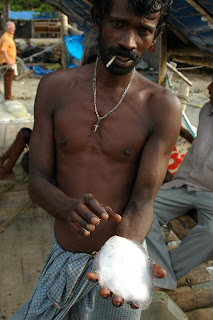subtle differences + fish nets
bombay style
 we are travelling deeper south into the diamond shaped subcontinent.
we are travelling deeper south into the diamond shaped subcontinent.and the further south we go, the darker the people get, the more rural the place feels, the more tropical and humid the climate, the slower the pace of life, and the more hotter
and hotter
and hotter
and hotter
and hotter
and hotter it gets.
daily siestas are no longer optional, but a necessary requirement.
me genevieve and emerson getting crunk on a rickshaw listening to hindi dance pop blasting from the speakers. or we're just going crazy from the heat
 southern india and northern india might as well be 2 different countries. the languages are different, people look different, regional cooking is different (seafood is big down south, and also, they even have beef on the menu, a no-no in the hindu dominated north), prevalent religions are different, and so on. but the old indian adage of everything is difficult in india, still applies to the south as it does in the north. but they do have subtle differences. for example, in the north, when you go to a train station and inquire about train times and reservations, if you ask the attendant a question, such as what time does the train leave for varanasi? they mumble something undecipherable to you. if you ask the same question (or any question) again, you verbally get your head chewed off. (i'm usually left thinking, why are you yelling? i'm not deaf, i just can't understand what you are saying?) in the background, there's usually 5 or 6 indians sitting around doing nothing. one of them might know the answer, in fact they probably all now the answer, but their poker faces (or faces of indifference) would never clue you in as to what information they're hiding.
southern india and northern india might as well be 2 different countries. the languages are different, people look different, regional cooking is different (seafood is big down south, and also, they even have beef on the menu, a no-no in the hindu dominated north), prevalent religions are different, and so on. but the old indian adage of everything is difficult in india, still applies to the south as it does in the north. but they do have subtle differences. for example, in the north, when you go to a train station and inquire about train times and reservations, if you ask the attendant a question, such as what time does the train leave for varanasi? they mumble something undecipherable to you. if you ask the same question (or any question) again, you verbally get your head chewed off. (i'm usually left thinking, why are you yelling? i'm not deaf, i just can't understand what you are saying?) in the background, there's usually 5 or 6 indians sitting around doing nothing. one of them might know the answer, in fact they probably all now the answer, but their poker faces (or faces of indifference) would never clue you in as to what information they're hiding.the only known penguins in india are at the train station in gokarna
 in the south, when you go to the train station and ask the same question what time does the train leave for varanasi? the 5 or 6 people doing nothing all give you a different answer. so the all important train connection that you are trying to make could be at 2:30 pm, or 6 pm, or 9 am, or 4:15 am, or 11:35 pm, etc. but one thing you can count on, is that the train won't arrive on time, so by 5 people offering 3 different answers, one of the 15 time choices has to be reasonably correct. you just have to figure out which one. so in the south, you sort of get an answer, but be careful young jedi. it's like that chinese finger puzzle that tightens around your fingers. the more you try, the harder it is to get them out. if you ask more people the same question, you'll just get 3 more diffent answers leading to exponential possibilities approaching infinity.
in the south, when you go to the train station and ask the same question what time does the train leave for varanasi? the 5 or 6 people doing nothing all give you a different answer. so the all important train connection that you are trying to make could be at 2:30 pm, or 6 pm, or 9 am, or 4:15 am, or 11:35 pm, etc. but one thing you can count on, is that the train won't arrive on time, so by 5 people offering 3 different answers, one of the 15 time choices has to be reasonably correct. you just have to figure out which one. so in the south, you sort of get an answer, but be careful young jedi. it's like that chinese finger puzzle that tightens around your fingers. the more you try, the harder it is to get them out. if you ask more people the same question, you'll just get 3 more diffent answers leading to exponential possibilities approaching infinity.so you see, in the north, your questions do not get answered, whereas in the south, your questions are answered in multiple choice form, leaving you, depending on your test taking skills, a 0.0-0.9% chance of getting the answer right. on either end of the country, after asking a question, you usually end up lost.
i'm glad to say that the indian head nod is spoken fluently here in the south as it is in the north, but possibly a different head dialect. either way, i still have no idea whether the head nod means, yes, no, maybe, i don't know, or go the f* away. usually it's all of the above all at the same time.
we're in fort cochin right now, which is a quaint fishing village/tourist trap.
the chinese fishing nets of cochin
 this fishing technique was introduced to cochin by the portugese when kerala was a colony. the portugese were taught this technique by the chinese. it involves dropping a large net into the water that is counter balanced by large boulders attached to ropes.
this fishing technique was introduced to cochin by the portugese when kerala was a colony. the portugese were taught this technique by the chinese. it involves dropping a large net into the water that is counter balanced by large boulders attached to ropes.fishermen at work
 yours truly doing my part to screw up an otherwise prosperous fishing day
yours truly doing my part to screw up an otherwise prosperous fishing day weighing in today's catch
weighing in today's catch doesn't this guy just look super cool smoking a bidi and holding some sort of grouper in his hand. if kerala fishermen were the wu-tang clan, this guy would be method man.
doesn't this guy just look super cool smoking a bidi and holding some sort of grouper in his hand. if kerala fishermen were the wu-tang clan, this guy would be method man. couple of fishies unique to india
couple of fishies unique to india
 always a fresh catch, Dónde está Ché Pelotas?
always a fresh catch, Dónde está Ché Pelotas?


0 Comments:
Post a Comment
<< Home